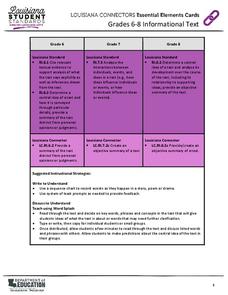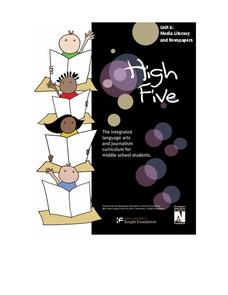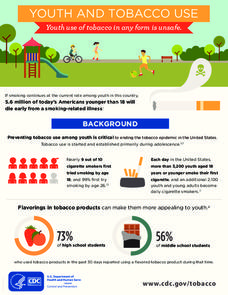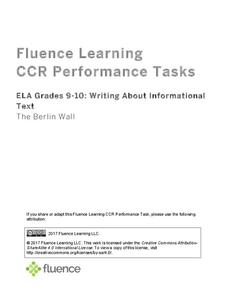Louisiana Department of Education
Essential Elements Cards
Use essential elements cards to help lesson plan! Each card contains an informational text common core standard for grade levels six through eight and suggestions for activities and supports. Cards address skills such as citing textual...
American Press Institute
High Five: Media Literacy and Newspapers
Teach the five different types of media with the first of three in a media literacy unit. Learners create and propose a final newspaper project, which must address information covered throughout the unit.
American Press Institute
High Five: Go to Press
High school scholars learn valuable information about how to run a newspaper in the third and final installment of a media literacy series. The unit scaffolds learners to success with background information before they plan for...
PBS
Racial Equality: How Far Have We Come and How Far Do We Have To Go?
Is everyone treated fairly in America? The culminating fifth lesson from a series of five has pupils explore racial inequalities from the 1960s and decide whether or not society has changed over time. The lesson comes with a speech from...
Centers for Disease Control and Prevention
Electronic Cigarettes: What's the Bottom Line?
A five-page infographic unveils the ins and outs of e-cigarettes. Numerous bullet points and pictures detail what e-cigarettes are, the ingredients found inside, and the health effects of using them.
Centers for Disease Control and Prevention
Statewide Smokefree Laws
Does your state allow smoking in public workplaces? What about in bars or restaurants? Take a look at an informative map of the United States to see what states do not allow smoking indoors, what states do not have indoor air laws on the...
Centers for Disease Control and Prevention
Equality in Smoking and Disease—Nobody Wins!
Fifty years ago, women were much less likely to die from smoking-related ailments than men. But thanks to targeted advertisements for and a wider availability of tobacco products, men and women are now equally susceptible to the health...
Centers for Disease Control and Prevention
Youth and Tobacco Use
There are a number of social, emotional, and physiological reasons why teenagers start smoking, and why they continue smoking into adulthood. Help class members understand why smoking begins in youth—and how to protect themselves from...
Centers for Disease Control and Prevention
Going SmokeFree Matters: Casinos
Everyone has the right to a smokefree workplace, but those who work in casinos are exposed to so much secondhand smoke that they can suffer the same ailments as heavy smokers themselves. Learn more about the effects of secondhand smoke,...
Centers for Disease Control and Prevention
Going SmokeFree Matters: Bars and Restaurants
Your students may not have ever had to decide between a smoking and nonsmoking area in a restaurant, but they still need to understand the health ramifications of secondhand smoke. A comprehensive infographic includes several facts about...
Centers for Disease Control and Prevention
Going SmokeFree Matters: Multiunit Housing
If you smoke cigarettes in an apartment or condominium complex, the secondhand smoke can travel through walls, ventilation systems, and plumbing to your neighbors' homes. Learn more about the ways smoking can affect those living in...
Centers for Disease Control and Prevention
Going SmokeFree Matters: In Your Home
Is secondhand smoke avoidable if you live with a smoker? Pupils look over an infographic to learn more about how secondhand smoke can travel throughout several rooms, who is more likely to be affected by smoke, and what health conditions...
NPR
The History of America’s Weed Laws
To understand the laws regarding marijuana use in the United States, you can go all the way back to the 1800's to learn about farming hemp, or you can go back to 2018 when California became the sixth state to legalize recreational...
PBS
March on Washington: A Time for Change
Young historians conclude their study of the events that lead up to and the planning for the March on Washington. After examining videos and primary source documents, they consider the civil rights objectives that still need to be...
J. Paul Getty Trust
Looking and Learning in the Art Museum — Lesson 3
Curator, artist, art handler, archivist, conservator-restorer, guide. Who would have thought there were so many different kinds of museum professionals? After a visit to an art museum, class members reflect on the role of the museum in...
J. Paul Getty Trust
Picturing a Story: Photo Essay about a Community, Event or Issue
Picture this. Class members follow in the footsteps of W. Eugene Smith, Dorothea Lange, James Nachtwey, and Lewis Hine by creating their own photo essay about a local event or issue.
Plimoth Plantation
Thanksgiving Interactive: You are the Historian
Take on the roles of two very different individuals living together during the same time: a pilgrim and a member from the Wampanoag Tribe. As learners navigate through the interactive, each click takes them to a part of each village to...
Fluence Learning
Writing About Informational Text The Berlin Wall
On June 26, 1963 President John F. Kennedy delivered his famous "Ich bin ein Berliner" speech close to the Berlin Wall at the Rudolph Wilde Platz. On June 12, 1987 President Ronald Reagan Delivered his famous "Mr. Gorbachev, tear down...
NPR
The Obama Years
Beginning with a quick writing prompt, young historians write about what they will remember most about President Obama's legacy. The activity opens up a larger discussion and exploration of his accomplishments, milestones, and the impact...
Research Parent
Solar System Cards
Find all things solar system in a set of reference cards. Even Pluto makes an appearance! Each of the 24 cards has a picture and accompanying informational text that gives brief background about the object.
Research Parent
Universe Cards
A 9-page packet comes with 24 cards that have pictures and informational text about each object in the universe. From nebulae to dwarf planets, objects we see—or don't see—are represented in the cards through pictures and words.
Federal Reserve Bank
Lesson 4: Back to School
Based on your current level of human capital, how long would it take you to earn $1,000,000? What about your potential human capital? Learners explore the importance of education and experience when entering the workforce, and compare...
Federal Reserve Bank
Lesson 1: Katrina Strikes
Most families have an emergency kit in their home with flashlights, water, and extra food. But what happens to your money when disaster strikes? An economics lesson focused on the aftermath of Hurricane Katrina in 2005 demonstrates the...
Curated OER
The Presidents of the USA
Get an in-depth look into each of our United States presidents with an interactive website that offers details from their date of birth, to their presidetial legacy, and everything in between.

























